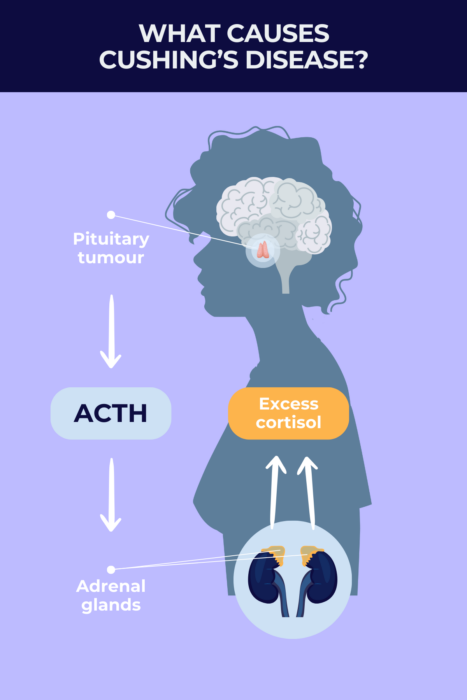FAQs about Cushing’s disease causes
Cushing’s disease typically is caused by a tumor in the brain’s pituitary gland. This pituitary tumor releases high levels of adrenocorticotropic hormone (ACTH), a signaling molecule that triggers the adrenal glands to produce cortisol. High cortisol levels ultimately cause the disease’s symptoms.
Cushing’s syndrome is a broad umbrella term referring to any disorder driven by high levels of the stress hormone cortisol. Cushing’s disease is a specific form of the syndrome in which high cortisol levels are driven by the presence of a tumor in the brain’s pituitary gland.
Cushing’s disease is caused by a tumor in the pituitary gland. Genetic conditions that increase a person’s risk of developing a pituitary tumor also may increase the risk of Cushing’s disease; however, not everyone with such a genetic disorder will develop Cushing’s disease. In most cases, Cushing’s disease occurs sporadically, meaning it does not run in families and is not related to the genes inherited from an individual’s biological parents.
Corticosteroids are medications that work by mimicking the activity of the hormone cortisol in the body. The use of these medications, particularly over long periods of time, may lead to the onset of Cushing’s syndrome, a broad umbrella term referring to any disorder whose symptoms are driven by excess cortisol. However, corticosteroids do not cause Cushing’s disease, which is a specific form of the syndrome caused by a tumor in the brain’s pituitary gland.
Cushing’s disease is caused by a tumor in the pituitary gland. The disease is more common in women than men and usually arises in people between the ages of 20 and 50. Other risk factors for its development include high blood pressure (hypertension), kidney stones, diabetes, and obesity.
Related Articles

 Fact-checked by
Fact-checked by 







